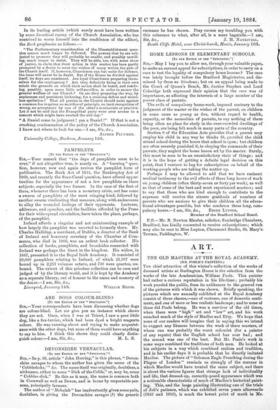PAMPHLETS.
LTO THE EDITOR OF THE " SPECTATOR." J
Sra,—Your remark that "the days of pamphlets seem to be over," if not altogether true, is nearly so. A " burning " ques- tion, however, now and again revives the pamphlet form of publication. The Bank Act of 1844, the Bankruptcy Act of 1869, and recently the Suez-Canal question, have offered oppor- tunities for the appearance of not a few pamphlets on these subjects, especially the two former. In the case of the first of these, whenever there has been a monetary crisis, out has come a swarm of pamphlets of the most stinging kind, followed by another swarm vindicating that measure, along with endeavours to allay the wounded feelings of their opponents. Lectures, addresses, and speeches, and the facilities afforded by the Press for their wide-spread circulation, have taken the place, perhaps, of tbe pamphlet.
Ireland affords a singular and not uninteresting example of how largely the pamphlet was resorted to formerly there. Mr. Charles Halliday, a merchant, of Dublin, a director of the Bank of Ireland and honorary secretary of the Chamber of Com- merce, who died in 1866, was an ardent book collector. His collection of books, pamphlets, and broadsides connected with Ireland was perhaps the finest in the kingdom. His widow, in 1867, presented it to the Royal Irish Academy. It consisted of 29,000 pamphlets relating to Ireland, of which 21,997 were bound up in 2,211 volumes octavo, and 700 were quartos, un- bound. The extent of this priceless collection can be seen and judged of by the literary world, and it is kept by the Academy as a separate library, out of honour to the name and memory of the donor.—I am, Sir, &v.,


































 Previous page
Previous page